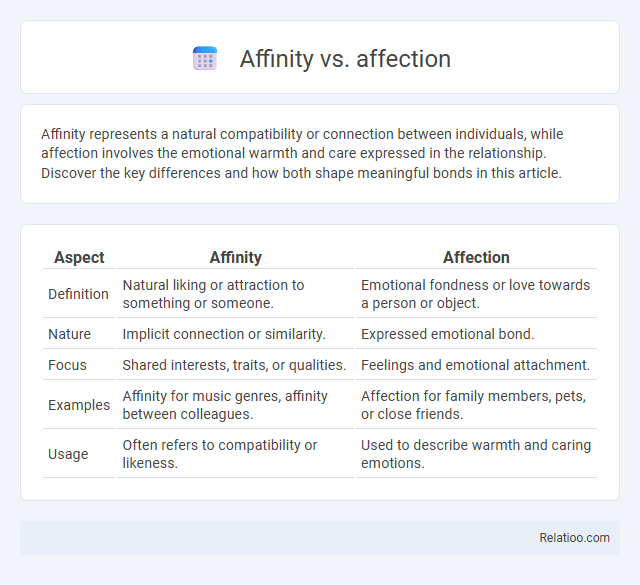Affinity represents a natural compatibility or connection between individuals, while affection involves the emotional warmth and care expressed in the relationship. Discover the key differences and how both shape meaningful bonds in this article.
Table of Comparison
| Aspect | Affinity | Affection |
|---|---|---|
| Definition | Natural liking or attraction to something or someone. | Emotional fondness or love towards a person or object. |
| Nature | Implicit connection or similarity. | Expressed emotional bond. |
| Focus | Shared interests, traits, or qualities. | Feelings and emotional attachment. |
| Examples | Affinity for music genres, affinity between colleagues. | Affection for family members, pets, or close friends. |
| Usage | Often refers to compatibility or likeness. | Used to describe warmth and caring emotions. |
Understanding Affinity and Affection
Affinity refers to a natural liking or attraction toward someone or something based on shared characteristics or interests, while affection involves a deeper emotional warmth and caring expressed through actions or feelings. Understanding affinity helps identify common grounds that foster relationships, whereas affection reflects the emotional bond strengthened through empathy and nurturing behaviors. Recognizing the distinction between these concepts enhances interpersonal connections by balancing shared interests with genuine emotional engagement.
Defining Affinity: Meaning and Context
Affinity refers to a natural liking, attraction, or relationship between people, ideas, or things based on shared qualities or characteristics. It often implies a sense of compatibility or connection that goes beyond simple preference or affection. Understanding affinity involves recognizing these inherent bonds in contexts ranging from personal relationships to biological similarities and cultural associations.
What Is Affection? A Clear Explanation
Affection refers to a gentle feeling of fondness or love toward someone or something, often expressed through physical touch, kind words, or thoughtful actions. It plays a crucial role in building emotional bonds and fostering close relationships by promoting trust and warmth. Unlike affinity, which denotes a natural liking or connection often based on shared interests, affection emphasizes emotional care and attachment.
Key Differences Between Affinity and Affection
Affinity describes a natural liking or inherent connection between people or things, often based on shared interests or characteristics. Affection refers to a feeling of fondness or tenderness towards someone, usually expressed through actions or emotions. The key difference lies in affinity being an innate or intellectual bond, while affection is an emotional or physical expression of love or warmth.
Psychological Foundations of Affinity
Affinity in psychology refers to a natural liking or attraction based on shared characteristics or emotional connections within interpersonal relationships. Unlike affection, which involves feelings of fondness or love, affinity stems from cognitive evaluations and unconscious psychological processes that foster a sense of familiarity and trust. Your understanding of affinity can enhance relationship-building by recognizing the underlying psychological foundations that drive mutual preferences and social bonding.
Emotional Impact of Affection
Affection creates a profound emotional impact by fostering warmth, trust, and connection between individuals, often expressed through physical touch or kind gestures. Unlike affinity, which denotes a natural liking or similarity, and affinity used also in technical or brand contexts, affection deeply engages the heart and strengthens relational bonds. The emotional resonance of affection promotes psychological well-being and nurtures intimate relationships more effectively than mere affinity alone.
Affinity in Relationships: Examples and Role
Affinity in relationships signifies a natural compatibility and shared understanding that fosters deeper emotional connections and mutual respect. Your affinity with someone often manifests through common interests, values, and effortless communication, which builds trust and strengthens bonds. Unlike mere affection or superficial attraction, affinity creates a lasting foundation essential for meaningful and supportive partnerships.
The Importance of Affection in Human Connections
Affection plays a crucial role in human connections by fostering emotional bonds and promoting feelings of warmth and security. Unlike affinity, which refers to a natural similarity or attraction, and affinities that denote multiple such connections, affection involves active expressions of care and love that strengthen relationships. Scientific studies show that regular affectionate interactions boost mental health, increase oxytocin levels, and reinforce trust among individuals.
When Affinity Turns Into Affection
Affinity describes a natural liking or connection between individuals based on shared interests or qualities, serving as the foundation for deeper emotional bonds. When affinity turns into affection, this initial connection evolves into genuine warmth, care, and emotional attachment, marking a shift from mere compatibility to heartfelt concern. Understanding this progression is key in relationships, highlighting how common ground fosters emotional intimacy and strengthens interpersonal ties.
Summary: Choosing Between Affinity and Affection
Affinity reflects a natural connection or similarity, often based on shared interests or characteristics, while affection is an emotional expression of fondness or love. Your choice between affinity and affection depends on whether you prioritize mutual understanding and compatibility or emotional warmth and personal attachment. Understanding these distinctions helps clarify the nature of your relationships and interactions.

Infographic: Affinity vs Affection
 relatioo.com
relatioo.com